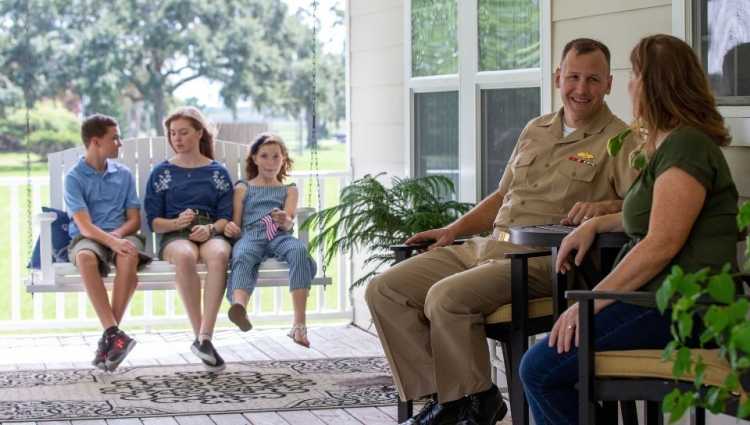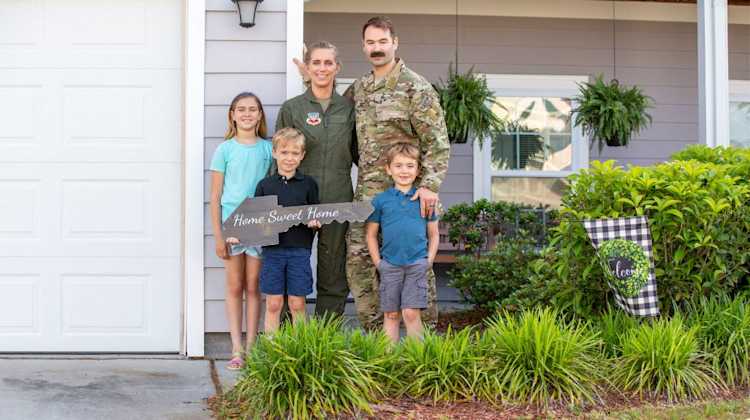Whether to Live on Base or Off Base?
by Lizann Lightfoot - September 27th, 2021

When you get PCS orders to a new location, one of the first questions to discuss is, “Should we live on base or off base?” You may quickly discover that families in the military community are very passionate about this question. Some people will give you an earful about why they absolutely love living on base. You’ll find just as many families who absolutely hate living on base and would not recommend it. Why such a big debate?
The problem is that all bases are not created equal, and neither are the off-base choices at different military installations. In some locations, the cost of living off base is high, so living on base may be the only option that fits your BAH. Even if on-base housing is older and not well maintained, at least it is within your budget, right? In other parts of the country, the off-base neighborhoods may be much more affordable, giving you greater variety and amenities than the cookie-cutter houses on base. The further from base you are willing to drive, the more options you will have. Also, housing preferences are ultimately a personal choice. The important, deciding factors that matter to you may not be important to another family, and vice versa. Living on base is a lifestyle that appeals to some–but not all–military families. You and your spouse need to discuss your preferences and the available options so you can decide where it’s best for your family to live. Do you have multiple children and need extra bedrooms? Is a two-car garage important for your hobbies? Do you have pets that require a lot of green space or a fenced-in yard? What about schools, walking paths, playgrounds, and distance to the spouse’s job? All of these things may factor into your decision when choosing where to live. That’s why PCSgrades has thousands of neighborhood reviews from fellow military families, on housing located both on base and in surrounding neighborhoods. You can read reviews for your next base here.
To start the conversation about whether it is better to live on base or off base, PCSgrades has gathered feedback from our readers, who have lived both on and off base. There may not be a perfect dream home at your next location, so use this list to help you decide the best fit for you.
Benefits of Living on Base
Security: Most on-base neighborhoods are essentially a gated community, with gate guards on duty 24/7. While this doesn’t eliminate all crime, it does mean base housing is generally safe. This can bring peace of mind when the service member is away for training or deployments.
Saving Money: Military housing contracts with private companies who manage the neighborhoods on base. They are allowed to charge “rent” that equals the service member’s full BAH, but not any amount over the BAH. This means you won’t pay out of pocket, even if you live on base for several years. And you won’t have extra bills for water, sewer, electricity, or trash pick-up. These are all covered in base housing, but are not typically included in an off-base rental fee.
Convenience: Depending on the size of the base, the service member may live just a few miles from work. If they forget something at home, it’s no big deal to swing by and pick it up. Spouses like the fact that many things on base are within walking distance. This could include schools, a grocery store (Commissary), the gym, and coffee shops. Also, maintenance is included for free in all base housing. So if something breaks while your service member is gone, there’s a 24-hour maintenance line to take your call.
Community: Since everyone living on base is a military family, you’re likely to have a lot in common with your neighbors. They understand PCS moves and deployments. They know how it feels to celebrate holidays far from family. They may have kids close in age to your own. This doesn’t mean everyone living on base is one big happy family, but there is certainly a unique and tight-knit sense of community on military bases that you’re unlikely to find elsewhere.
Amenities: A military base is like a self-contained town, with all the essential services located close to home. Families often have access to base schools, the gym, the library, a gas station, the Commissary, the Exchange, an autoport, childcare center, a chapel, swimming pool, dog parks and playgrounds. These services, located close to housing and offering military discounts, are incredibly convenient.
More Family Time: If the service member has a shorter commute, they will be home sooner, and more often. They won’t spend a half hour sitting in traffic waiting to get through the gate. The kids won’t have to wait up as late just to say goodnight. And it’s a lot easier to meet for lunch.
Schools: This was a mixed response from our readers, depending where they were stationed. Some military bases have on-base schools that are open primarily (though not exclusively) to military kids. Typically located close to base housing, these schools are convenient and make it easier for kids to connect with friends. However, just as many people said they found better quality schools off-base in neighboring districts. So it’s important to do your research before moving to a new area.
Better Quality Homes?: This was another mixed response that really depends on location. Some bases have renovated or built larger homes, while others have small, outdated units. Depending on the base and the service member’s rank, you may have access to larger, newer homes on base than if you applied their BAH to the local off base neighborhoods. Again, it’s important to research the market and learn about the area.
Problems with living on base
Long Waiting Lists: Let’s start with this one because sometimes even when you want to live on base, you simply can’t because the wait list for housing is over a year long! Some bases are notorious for having a long wait list for base housing. If you don’t feel like playing the housing lottery, moving multiple times, or dealing with a temporary lease, then it may be best to live off base from the beginning.
Housing Isn’t Always Worth the BAH: Again, this depends on the location, but it was a common complaint from our readers. Many bases have old, outdated housing with significant mold issues. At these locations, you can probably find a better deal in town. Also, if a service member gets promoted while living in base housing, they don’t always get new housing or pocket any extra money from their BAH. Instead, the housing office automatically adjusts their rent to match their new BAH. When this happens, they may find more “bang for their buck” off base.
Waiting on Maintenance: No one likes dealing with the housing office. Military housing on base is managed by private companies. Residents rely on them for maintenance issues, painting, outdoor cleaning, and some lawn care. But because they manage hundreds or even thousands of units on base, it can be difficult to have your requests heard. And forget about asking them to adjust their maintenance schedule for your sake. We once had painters spraying the outside of our home on the day we were moving furniture out–even though we had called the office three times to tell them our moving date!
Options are Limited by Rank: Most housing neighborhoods are organized by rank and family size, so your service member will only qualify for particular neighborhoods or floor plans. If these options are full, you will have to join a waiting list. If the service member is promoted, they typically do not have to change homes, but they may choose to move (paying out of pocket for all expenses) if there are better homes in the higher-ranking neighborhood.
Drama: From noisy kids to loud music to barking dogs, base housing can be a bastion of petty complaints. Most houses are close or even connected to other units, so there are lots of opportunities for your neighbors to annoy you. In general, if you keep your head down and mind your own business, things will be fine. But it only takes one lazy pet owner or one passive-aggressive post on the community Facebook page to make your on-base neighborhood miserable.
Benefits of living off base
Separate Work From Home: Some people prefer to live off base just so they can physically get away from the military bubble. If you already work around service members all day, you may not want them as your neighbors too.
Better Schools: This varies depending on location (see our note under Benefits of Living On Base), but when you choose to live off base, that means you can choose the best local school district and find a house within its boundaries. Remember that housing costs are often tied to school districts, so be prepared to see more competition for a property in a desirable district.
Fewer Pet/ Breed Restrictions: Most base neighborhoods limit you to two pets, and some do not allow any pets. They also restrict certain breeds of dogs. If you rent or belong to a Homeowner’s Association, look for a contract that accommodates your pets. You may need to pay an extra fee, but it’s worth it. Usually if you buy a home, you may have as many pets as you desire!
Home Ownership: Buying a home is a big responsibility, but it comes with the potential for big financial rewards. Every year you pay a mortgage, you are building equity in your home. Homeowners qualify for tax breaks that renters do not. And when you move, you can either sell your home, or rent it out to make a profit.
Better Value for BAH: See our comments in the above sections. At some locations, you can get more house for your money when you live off base. Research your area to see if off base neighborhoods in your location have newer homes, larger garages, more square footage, and larger yards than the homes you qualify for on base.
More Housing Options: Many military base neighborhoods look the same. Houses typically have tiny yards, and there are only a few available floor plans. When you live off base, you can choose from any style in the surrounding area: one story or two, historic Craftsman or modern, split-level or rancher, new construction neighborhood or established wooded lot. You can also choose a property with more land for animals or hobbies.
Potential to Save Extra BAH: If you rent a place or buy a house with a reasonable mortgage, your monthly payments may be lower than your BAH, allowing you to pocket the difference. This is easier at some bases than others, but can be a good motivation to shop for a home in town. You can check your local BAH rate at our BAH Calculator here. Remember to budget for your utilities, trash removal, and lawn care, which are usually not included in your rental or mortgage fees.
More Job Opportunities for Spouse: If the spouse is planning to work in the local community, they will have more options and a shorter commute if they live off base. This is also true if they plan to attend local college for classes.
Problems with Living off base
Longer Commute for Service Member: Most off-base communities will be farther from work than base housing neighborhoods, although this isn’t always the case at the larger military bases. Before you move, calculate driving distances from different area locations to get a sense of distances and traffic patterns. Don’t forget to add on extra time for moving through the base gate to get to and from work each day!
Paying out of Pocket: Depending on the local market, you may discover that average rental rates and monthly mortgage payments are higher than your BAH. Even if your payments equal your BAH, remember that you will pay extra for services that are typically included in military housing, such as water, sewer, electricity, trash pickup, snow removal, and lawn care.
Less Maintenance Help: When you own your house, you are responsible for all maintenance and repairs. Of course you can call a professional to help when needed, but those visits come with a high bill. If you rent, your landlord is responsible for maintenance. Some are more prompt and helpful than others.
Civilian Neighbors: There’s no solid rule that a military or a civilian family makes a better neighbor. However, if you move into an established civilian neighborhood, you are more likely to be seen as a newcomer or outsider. You may find that your neighbors don’t understand the challenges of military life or even dislike service members. Some families say they have a harder time adjusting after a PCS if they are in off base housing.
Lack of Military Support: Depending how far you choose to live from base, you may find yourself separated and feeling disconnected from events on base. It is more difficult to take advantage of amenities like the Commissary or the free gym when you are living farther away. It’s also harder to establish relationships with fellow military families. You may be less likely to attend base functions, and other service members or spouses may be less likely to drop by for a visit. Some people are fine with this distance, while others feel disappointed to be alone, especially during deployments or when the service member is away.
Ultimately, the decision of whether to live on base or off base is up to you! You will need to weigh the options and consider which of these factors is most important to you or your family. PCSgrades can help with Area Guides, housing market information, and connections to military-friendly real estate agents so you can find the home and the neighborhood that are the best fit for you!







